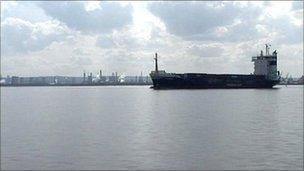Leith ruled out for Forth Energy biomass plant
- Published

Forth Energy says it is still committed to biomass plants at three other Scottish ports
A company behind proposals to create biomass plants at four Scottish ports has withdrawn its plans for a facility at Leith.
Forth Energy said it was re-assessing the situation after proposals were unveiled to develop the Port of Leith as a hub for offshore renewable energy manufacture and support.
The company is a joint venture between Forth Ports and SSE.
It said it remained committed to plants at Dundee, Grangemouth and Rosyth.
The combined heat and power (CHP) plants are expected to create hundreds of construction jobs, as well as more than 100 permanent posts.
The energy would be used to power the ports, with any excess being exported to the national grid.
The plans have come in for criticism, with protests staged at Grangemouth docks by campaigners who claimed biomass plants caused "more climate change, deforestation and pollution".
Forth Energy has claimed that the biomass plants would use sustainably-sourced fuel and produce low carbon electricity and heat.
The Port of Leith has been identified by Scottish Enterprise as Scotland's top location for manufacturing renewables.
Calum Wilson, managing director of Forth Energy, said: "Much has changed since we first applied for permission to build a CHP plant at Leith, not least the port's emerging status as a hub to support the Scottish offshore renewable energy industry.
"We remain fully committed to bringing reliable, responsible, renewable heat and electricity to Scotland through our proposed developments at the ports of Grangemouth, Rosyth and Dundee and, in the process, assisting the Scottish government in achieving its ambitious 2020 renewable energy targets."
He added: "Once the configuration of the Port of Leith has been established, we will re-assess the opportunity and industrial demand for renewable energy and heat at the port."
Charles Hammond, chief executive of Forth Ports, said: "The level of demand from renewables companies keen to locate at the Port of Leith means that it is appropriate that we draw breath while we see how the land configuration at the port evolves."
Stan Blackley, the chief executive of Friends of the Earth Scotland, welcomed the move.
He said the proposals were "highly inefficient and in breach of EU standards" and would threaten local air quality.
"The threat of big biomass plants in Dundee, Rosyth and Grangemouth remains, and we will continue to challenge these applications," he added.
Dr Richard Dixon, director of WWF Scotland, added: "The scheme was neither needed nationally nor wanted locally."
- Published17 May 2011